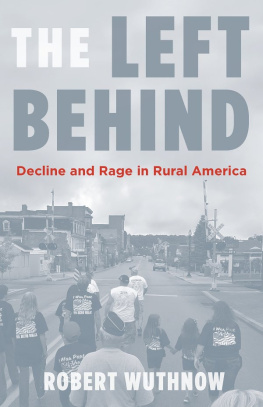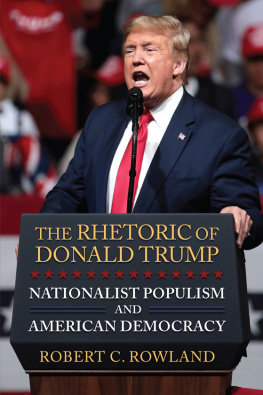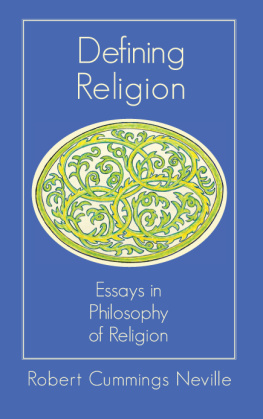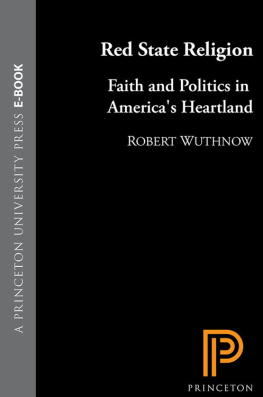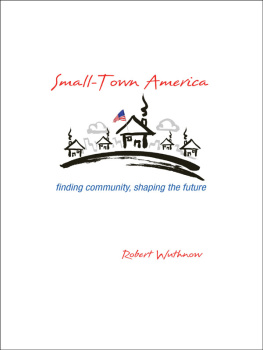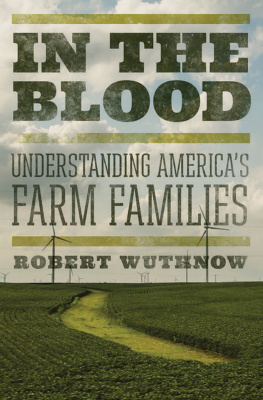Copyright 2021 by Princeton University Press
Princeton University Press is committed to the protection of copyright and the intellectual property our authors entrust to us. Copyright promotes the progress and integrity of knowledge. Thank you for supporting free speech and the global exchange of ideas by purchasing an authorized edition of this book. If you wish to reproduce or distribute any part of it in any form, please obtain permission.
Requests for permission to reproduce material from this work should be sent to
Published by Princeton University Press
41 William Street, Princeton, New Jersey 08540
6 Oxford Street, Woodstock, Oxfordshire OX20 1TR
press.princeton.edu
All Rights Reserved
Library of Congress Cataloging-in-Publication Data
Names: Wuthnow, Robert, author.
Title: Why religion is good for American democracy / Robert Wuthnow.
Description: Princeton, New Jersey : Princeton University Press, [2021] | Includes bibliographical references and index.
Identifiers: LCCN 2021018383 (print) | LCCN 2021018384 (ebook) | ISBN 9780691222639 | ISBN 9780691222646 (ebook)
Subjects: LCSH: DemocracyUnited StatesReligious aspects. | Religion and politicsUnited States. | Political participationUnited StatesReligious aspects. | Religious pluralismPolitical aspectsUnited States. | Political cultureUnited States. | United StatesReligion. | BISAC: SOCIAL SCIENCE / Sociology of Religion | POLITICAL SCIENCE / Civics & Citizenship
Classification: LCC JK1726 .W87 2021 (print) | LCC JK1726 (ebook) | DDC 322/.10973dc23
LC record available at https://lccn.loc.gov/2021018383
LC ebook record available at https://lccn.loc.gov/2021018384
Version 1.0
British Library Cataloging-in-Publication Data is available
Editorial: Fred Appel and James Collier
Production Editorial: Mark Bellis
Jacket Design: Karl Spurzem
Production: Erin Suydam
Publicity: Kate Hensley and Kathryn Stevens
Copyeditor: Laurel Anderton
Introduction
RARELY IN OUR NATIONS HISTORY have so many thoughtful observers voiced so many urgent messages about the need to understand and better protect the foundations of American democracy. To the familiar challenges of partisan polarization and gridlock has now been added the troubling prospect of cherished democratic traditions being subverted by far-right nationalistic extremism, plutocracy, self-dealing, and sheer incompetence. The warnings are credible. Democracy is in danger unless the citizens it seeks to protect work for its preservation.
Religionhow it is practiced, what it impels people to dois again at the center of debate about our collective well-being. We are a nation of many religions and of many views about religion. Some of Americas faith communities imagine God to be visiting us with difficulties to teach us a lesson. Others hope for an end to the nonsense they see perpetrated by religious leaders. And if religion is troubling, some argue, things could be much worse without it. Democracy would wither, they contend, without the leavening influences of faith.
How do the diverse practices that characterize religion in the United States strengthen democracy? Or do they strengthen it? What do these practices contribute, if anything, to public advocacy about democracys basic principlesfair representation, liberty of conscience, freedom of assembly, human dignity, and equality?
The claim I make in the following pages is that religion is good for American democracy less because of the unifying values it might provide and more because of religions capacity to bring diverse values, interests, and moral claims into juxtaposition with one another. Through its diversity, religion contributes to the contending beliefs, values, arguments, and counterarguments that constitute the debate about how to order our lives together. People who care about religionincluding those who doubt its valuevehemently disagree with one another and take adversarial positions toward one another. This diversitythese diverging practices and the moral convictions they implyanimates American democracy, sometimes in ways that pose questions about whether we can agree on anything, but more often with robust outcomes that reflect advocacy and counteradvocacy. Contention about what we hold dear is central to democratic processes: voicing strong convictions about what is unequivocally right, advocating for conflicting definitions of the common good, affirming and modifying basic points of agreement, and refining the procedures that make living together possible. Religious diversity is woven into this contention, augmenting it and supplying it with competing ideas, practices, and values.
Conceived in this manner, religious groups potential to benefit American democracy occurs in several ways. They can mobilize resistance to the authoritarian threats of autocratic leaders, support efforts to uphold freedom of conscience, organize voluntary associations, and defend these associations independence. Additionally, religious groups can advocate for human dignity, provide social services and support, champion the value of inclusive orientations, and address the threat to democracy of economic inequality. The key to understanding these potential benefits is how religious groups with diverging convictions understand their civic roles and relate to one another. Differing groups bring multiple perspectives to bear on social issues, articulate claims and counterclaims, mobilize in opposition to one another, check one anothers aspirations, and give voice to constituencies with differing values and interests. None of this follows a set pattern. It happens in historical contextswhere religions diverse contributions are most clearly seen.
The historical episodes I discuss begin with an examination of how the most influential religious groups in the early 1930spredominantly Protestant, Roman Catholic, and Jewish organizationsdrew on their differing locations and beliefs to warn constructively about the imminent threat of authoritarianism. I then discuss religious diversitys role in redefining freedom of conscience in the late 1930s and early 1940s. In the 1950s we see religious groups advocating for freedom of assembly and from the 1960s through the end of the century contending about human dignity and welfare provision. In recent decades a further role of religious diversity is evident in discussions of immigrant rights, the wealth gap, and the response to COVID-19. In each instance, the details of what happened are broadly familiar, documented by journalists and social scientists. Building on this information, I show why it mattered that religious practices were present and why it was significant that leaders and the groups they served so often took adversarial positions toward one another.
Democracys strength depends on the rule of law, the Constitution, freedom of speech and assembly, fair elections, and the nations system of government checks and balances. These principles and institutions have served democracy well. The multilayered complexity of these arrangements, frustrating as it often is, safeguards American democracy. When democracy is threatened, Americans historically have trusted the laws, the lawmakers, the courts, and the press to protect it. Today, no less than in the past, democracys resilience depends on responsive representative institutions, fair elections, active civic participation, freedom of expression, and adherence to constitutional norms. Unless these institutions and norms are respected, democratic governance is weakened.



